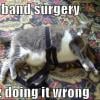Search the Community
Showing results for 'Complications'.
Found 17,501 results
-


Increased restriction at 11 weeks out?
Escape_Pod replied to Escape_Pod's topic in POST-Operation Weight Loss Surgery Q&A
Interesting! I do still get hungry, but right now I get full on much less than I did before, and I stay full longer. Maybe it just took longer for my stomach nerves to regenerate after surgery? I guess I figures at this point I'd be gradually eating more, not less. It will be interesting to see if this is just temporary (this is day 4 of this changed appetite), or if this is my new normal. This is definitely a learning experience, isn't it? Complicated by the fact that people's personal experiences vary a lot. I guess the important thing is learning to listen to what my body's telling me, and focus on getting the best possible nutrition from whatever I do eat. -
Globe and Mail - Tues March 13th, 2007 There's a downside to obesity surgery SHERYL UBELACKER Canadian Press TORONTO — When people with obesity have surgery to help them lose weight, they can also lose something else — the ability to properly absorb certain nutrients, in particular Vitamin B1. And that deficiency can potentially lead to permanent brain damage if left untreated, researchers say. In a review of the medical literature, researchers at the Wake Forest University School of Medicine found 32 cases of bariatric surgery patients who developed symptoms of Wernicke encephalopathy, a condition marked by memory loss and confusion, an inability to co-ordinate movements and rapid eye movement. Wernicke's is caused by a deficiency in vitamin B1, also called thiamine, and these classic symptoms are usually seen in alcoholics, said lead author Dr. Sonal Singh, an internal medicine specialist at Wake Forest University in Winston-Salem, N.C. “But interesting to our study, we found that these people also had other symptoms, like hearing loss, convulsions and tingling and numbness of the arms and legs — symptoms that have not been previously described with Wernicke's,” Dr. Singh said in an interview. That made the researchers wonder if these bariatric surgery patients were suffering from more than just a B1 deficiency and may have been experiencing a deficit of other critical nutrients or had developed immunological problems. Strangely, almost half of the patients with the neurological symptoms showed no brain lesions when given an MRI scan, said Dr. Singh, whose study is published Tuesday in the journal Neurology. Of the 32 patients — who had one of four weight-loss surgeries, including gastric bypass and gastric banding — 13 made a full recovery. Eighteen others were left with various levels of dysfunction and one patient, a 33-year-old woman, died. Most had experienced vomiting prior to onset of the neurological symptoms, said Dr. Singh, noting that patients ranged in age from 23 to 55, and 27 of the 32 were women. (In the United States, 75 per cent of bariatric surgery patients are women, he said.) The vomiting could have been caused by any of several factors, including the anatomical changes created by the surgery; blockages caused by swelling around the surgical area; and ulcerations or other erosions of the stomach developed following the operation. “When people who have had weight-loss surgery start experiencing any of these symptoms, they need to see a doctor right away,” stressed Dr. Singh. “Doctors should consider vitamin B1 deficiency and Wernicke encephalopathy when they see patients with these types of neurological complications after weight-loss surgery. If treated promptly, the outlook is usually good.” The average point at which patients began exhibiting Wernicke's symptoms was four to 12 weeks after surgery, although one patient developed problems two weeks after the operation and another 18 months later. Dr. Singh said his study could not determine how common Wernicke's encephalopathy is among people who have surgery to help them lose weight, and he said studies that follow patients are needed to establish how often it occurs. While some doctors prescribe thiamine supplementation after bariatric surgery as a matter of course, Dr. Singh believes national standards should be set for physicians to follow. “This is an emerging risk which is going to become more important in the future as more people get surgery,” he said.
-
Here's an article from Yahoo News Child stomach surgeries more popular <!-- END HEADLINE --> <!-- BEGIN STORY BODY -->By DAVID B. CARUSO, Associated Press Writer 25 minutes ago As the popularity of stomach surgery has skyrocketed among obese adults, a growing number of doctors are asking, "Why not children, too?" For decades, the number of kids trying weight-loss surgery has been tiny. The operations themselves were risky, with a death rate of about 1 in 50. Children rarely got that fat, and when they did, pediatricians hesitated to put the developing bodies under the knife. Only 350 U.S. kids had such an operation in 2004, according to federal statistics. But improvements in surgical technique and huge increases in the number of dangerously obese children have begun fueling a change of heart. A group of four hospitals, led by Cincinnati Children's Hospital Medical Center, are starting a large-scale study this spring examining how children respond to various types of weight-loss surgery, including the gastric bypass, in which a pouch is stapled off from the rest of the stomach and connected to the small intestine. Three more hospitals have approval from the food and Drug Administration to test how teens fare with a procedure called laparoscopic gastric banding, where an elastic collar installed around the stomach limits how much someone can eat. The FDA has hesitated to approve the gastric band for children, but surgeons at New York University Medical Center reported in the Journal of Pediatric Surgery this month that the device holds promise. The 53 boys and girls, aged 13 to 17, who participated in NYU's study shed nearly half their excess weight over 18 months, while suffering relatively minor complications. Crystal Kasprowicz, of St. James, N.Y., said she lost 100 pounds from her 250-pound frame after having the band installed at age 17. "I'm a totally different person," she said. Before the procedure, Kasprowicz said she took medication for a rapid heartbeat and was showing signs of developing diabetes. Every effort she made to stop getting bigger failed. Dieting didn't work, she said. Her heart problems made it hard to exercise. Even walking up stairs was a challenge. Now, she's off the heart drugs. Her blood-sugar levels are in check. She also feels better about herself. "I'm very outgoing now," said Kasprowicz. "I hike a lot ... I go to the beach in the summer now. I'm not as self-conscious when I go shopping for clothing." Similar studies are under way at the University of Illinois Medical Center in Chicago and at the Morgan Stanley Children's Hospital of New York-Presbyterian, which recently opened a weight-loss surgery center for teens. Doctors there expect to conduct about 50 operations this year. Children are only considered candidates for surgery after they have spent six months trying to lose weight through conventional methods under hospital supervision. But so far, not a single one has slimmed down enough to take surgery off the table, said Dr. Jeffrey Zitsman, associate attending surgeon at Morgan Stanley Children's Hospital. "That battle can only be won in a few instances," he said. The studies have followed a huge surge in the popularity of obesity surgeries among adults. The American Society for Bariatric Surgery estimates that more than 177,000 Americans had weight-loss surgery last year, up from 47,000 in 2001. Not everyone is pleased that kids might be next. "I don't think altering the human digestive tract is a solution to the problem of excess weight," said Joanne Ikeda, a nutritionist emeritus at the University of California, Berkeley. "It's one of these quick-fixes that isn't a fix at all." Doctors, she said, still know relatively little about the long-term effects of such operations on the very young. The federal Agency for Healthcare Research and Quality released a study in July that said four in 10 weight-loss surgery patients develop complications within six months. Among adults, mortality rates among gastric bypass patients remain at between 1 in 100 and 1 in 200 patients. Laparoscopic gastric banding has been shown to have a much smaller death rate — about 1 in 1000 patients — but complications do occur. Of the patients who participated in the NYU study, two needed a second operation to adjust a slipping band; two developed hernias; five got an infection; five suffered mild hair loss and four had Iron deficiencies related to their new diet. After the study was complete, one patient asked to have her band removed because of discomfort, said Evan Nadler, a pediatric surgeon and co-author of the study. Nadler said those complications were minor compared to the chronic diabetes and cardiovascular disease teens would face if they remained that heavy into adulthood. "These are people who have tried everything they could possibly try," he said, noting that their mean weight at the study's start was 297 pounds. "Once they reach this level of morbid obesity, the vast majority go on to be obese adults," he said. Thomas Wadden, an obesity expert at the University of Pennsylvania School of Medicine, said surgery can be of immense benefit to some teens, especially those already experiencing health problems. But he also advised caution. Egged on by TV shows and commercials expounding the benefits of weight-loss surgery, adult patients have begun showing up at Penn's Center for Weight and Eating Disorders demanding an operation as an easy first step to thinness. "When we ask them, 'What have you done so far to lose weight?' The patients say, 'Nothing,'" Wadden said. "They're going right to a $25,000 operation for which they are ill-prepared." It would be tragic, he said, to see the same phenomenon repeated among children. "They have to be selected with caution to make sure that this aggressive step is absolutely necessary."
-
I think it has to do with how the surgeon sews the stomach over the band to hold it in place. It they sew it too tight blood doesn't get to that area of the stomach and it eventually erodes. The band literally grows into the stomach. There are other threads on here about erosion and one has a surgeon from Cincinnati that gives a really good explanation. I had my band installed Dec07. This is a typical complication 10% or so have this problem. The band will have to be removed and the stomach stitched up.
-
Heya everyone! I am about 12 hours away from the actual time of my surgery tomorrow morning, and I am terrified. Even though I am in the program at a Center of Excellence and my doctor has an amazing success rate with an incredibly low rate of complications, my anxiety is still through the roof. I adhered to my pre-op diet and all the testing I had to go through came back A-OK (my PA told me that I am, and I quote, "a healthy fat kid"), but my mind keeps racing with all the "what-ifs". How did you veteran sleevers deal with your pre-op anxiety, if you had any? Also, is there anyone else getting sleeved on or around tomorrow (December 9th)? I'd love to have some surgery buddies! Lots of huggles to everyone! ~ Polara
-
Some of the individuals on this website did have that condition and it caused them problems. It is important to get this condition treated before surgery. According to the internet: Therapy for H. pylori infection consists of 10 days to 2 weeks of one or two effective antibiotics, such as amoxicillin, tetracycline (not to be used for children <12 yrs.), metronidazole, or clarithromycin, plus either ranitidine bismuth citrate, bismuth subsalicylate, or a proton pump inhibitor. Another article says: Nausea and vomiting are the most common complaints after bariatric surgery, and they are typically associated with inappropriate diet and noncompliance with a gastroplasty diet (ie, eat undisturbed, chew meticulously, never drink with meals, and wait 2 hours before drinking after solid food is consumed). If these symptoms are associated with epigastric pain, significant dehydration, or not explained by dietary indiscretions, an alternative diagnosis must be explored. One of the most common complications causing nausea and vomiting in gastric bypass patients is anastomotic ulcers, with and without stomal stenosis. Ulceration or stenosis at the gastrojejunostomy of the gastric bypass has a reported incidence of 3% to 20%. Although no unifying explanation for the etiology of anastomotic ulcers exists, most experts agree that the pathogenesis is likely multifactorial. These ulcers are thought to be due to a combination of preserved acid secretion in the pouch, tension from the Roux limb, ischemia from the operation, nonsteroidal anti-inflammatory drug (NSAID) use, and perhaps Helicobacter pylori infection. Evidence suggests that little acid is secreted in the gastric bypass pouch; however, staple line dehiscence may lead to excessive acid bathing of the anastomosis. Treatment for both marginal ulcers and stomal ulcers should include avoidance of NSAIDs, antisecretory therapy with proton-pump inhibitors, and/or sucralfate. In addition, H pylori infection should be identified and treated, if present.
-


Complications Poll
JamieLogical replied to VonJuke's topic in POST-Operation Weight Loss Surgery Q&A
There was a site-wide poll conducted on this pretty recently. You can see the thread here: http://www.bariatricpal.com/topic/330927-did-you-have-complications-after-weight-loss-surgery/ -


What About The Good (Amazing) Stories?
nieuwevis replied to creativediff's topic in POST-Operation Weight Loss Surgery Q&A
I'm only 5 months in, and it's going great. I'm down 89 from surgery, had no real complications, and have no regrets. Best of luck to you! -


What About The Good (Amazing) Stories?
QuilterGal replied to creativediff's topic in POST-Operation Weight Loss Surgery Q&A
I am a little more than 3 months out and approaching a total WL of 80# (pre and post RNY). I had a great recovery and no complications. -
I read that the amino acid glutamine helps heal stomach lining. That's the real issue for me , why I have not been banded yet (and I have been approved for 6 months now) is no one has been long term with the band either successfully or with complications. I have not met one person who has had the band for 10 or more years and that bothers me. I'm kind of surprised it doesn't bother anyone else before being banded. :-/
-
I wasn't necessarily having "problems." It's way too hard to describe, but the band is like a fine instrument. Only a professional piano player can hear when his instrument is off key. My belly was off key, that's the best I can say. It felt different, odd, squishy. My restriction was there, but then it would go away, the old normal digestive feelings are more rumbly, and I can feel my lower stomach a lot more now. I used to feel the squiggle of Water and hear the funny funnel noise when I drank liquids. I'd drink, then a minute later I'd hear the noise. Now I don't hear it, things go straight through, and the bottom belly rumbles oddly. I had lots of port complications, and so far everybody I know that had a Mexican port issue ended up eroded. So I demanded the endoscopy as a rule of general housekeeping. I would have been shocked if I didn't have erosion. Some people had no symptoms, but I can definitely feel and hear the difference from a year ago. Kel, seems lots of posts are getting lost in this new format. I can't find stuff any more!
-
I'm one month post op, and still off. Im having slight complications with nausea though :/ Hoping to feel well enough to go back in 2 weeks (thinking by then I should be ok). I also have to lift things during work so the dr. told me 6 weeks off the bat.
-
I think the traveling part would be fine if your doctor is ok with it. I agree though that with the limited food choices you will have at that time a cruise may not be the best option. I am in Texas and going to San Diego next week. I cannot wait for the 70 degree temps there! If you do book a trip it might be good to get something refundable or purchase the insurance that allows you to cancel. Just in case you don't feel up to going or in the super rare case you have a complication.
-


Smoking After Surgery
tamihill replied to sexycanadian's topic in POST-Operation Weight Loss Surgery Q&A
I understand what you're saying. But, we as adults have to make our own decisions. If someone decides to eat 5 donuts than that is a decision that they have to live with. There are risks to any surgery. And you know as well as I do that not everyone has or will have complications. Everything we do in a life is a chance we all take. Even if surgery wasn't involved. Ulcers can happen even if you don't smoke. No one is ever guarenteed 100% perfection. We all have our vices. I do appreciate your input though..... -


Get insurance to approve without requirement?
VSG148Sz6 replied to oklafarmgal's topic in Insurance & Financing
Ok here goes...I just joined this forum to get answers as well but I feel unless I say something someone else won't get answers.....I had the lapband inserted march 2008....started at 237...5'8" (recorded but incorrect) so I met the guidelines. After a baby I went up to 259 then down to 193...lowest with band....I started having complications with the band....leaking....didn't feel Anything until three months in when started having severe pains. In and out of hospital resulted in the removal of my band.....we were waiting first for the insurance comp to approve fixing the band but they denied..."not medically necessary" since I was now not "morbidly obese"anymore..... Then tried for the sleeve...denied again..."experimental bc my bmi was below 35.....I had the band removed to find out the tube cracked.....the band was literally cutting up my insides. Since surgery on October 2, I have gained 17lbs and now meet the 35 bmi but the insurance company wants a letter of medical necessity. Normal you would have to go under supervised weight loss program monitoring for 3 months but my internal medical doctor is hopeful that his letter showing my past six year struggle will suffice. If I don't get approve under my insurance I will try my husbands and if denied under his ill end up paying for it.....I find it ironic that they knew I had a weight problem approved the first device, then when it became defective I'm no longer a candidate. Nothing within my control.....I'll be patient and wait my turn. Hopefully all goes well by the summer. -
Have you had a very large, very satisfying poop? Chances are you are backed up...but you can never be sure in this situation. You are probably far enough out that surgical gas is not the cause, but your intestines are "whack" for a while. And can cause great pain and cramping. But that can also be from other surgical reasons too. Call your doc. Generally if you can eat and drink and keep things down and keep well hydrated and don't have to medicate with opiods to control the pain it's a normal thing for the biggest percentage of folks. But there are complications...
-


Pregnancy And Sleeve
sassypants replied to Luckystar12's topic in POST-Operation Weight Loss Surgery Q&A
I was told that the first 18months is a no go area for pregnancy because of all the potential problems birth defects and possible miscarriage as your body takes roughly a year to fully heal from any surgery. Also 18months out your in a no pain/mends/eating well stage to not have possible complications. We were also told that we have to be extra careful for the first 6 months after the op because most people are extremely fertile due to all the hormones being released. But this op isn’t a problem when its time because your not poorly nutritioned or doing the mal absorption thing you can eat balanced just fine its just smaller and you may have to increase how many times you eat in a day when pregnant to keep up with the baby needs. -


Help! VSG or Bypass
I♡BypassedMyPhatAss♡ replied to RaisnHL's topic in PRE-Operation Weight Loss Surgery Q&A
These are my thoughts, coming from a patient going through a revision from Lap Band to Bypass... If you ultimately go with Sleeve, you may encounter complications like GERD years down the road. This is due to the Sleeve being a high pressure system. The high pressure created in the pouch puts pressure on the esophageal sphincter and causes it to fail, which results in GERD. It often takes years to manifest, and when it happens, it ultimately forces your hand to revise to Bypass. That's my current situation. When I got Lap Band, I was scared of Bypass. But as I've investigated more about Bypass, I understand now why it is the Gold Standard of weight loss surgeries. It's been around longer than other weight loss surgeries, so it has been perfected over the years. I wish I would've chosen Bypass from the beginning and saved myself a lot of unnecessary complications and I never made it to goal weight either. As for being self pay, and Bypass costing more... imagine a few years down the road having untreatable GERD and having to have a second surgery. So think of the increased expense of Bypass now as an investment if you choose to go that route. If you're having doubts about your PCOS causing cravings, Bypass might help to keep your eating on track, if you're a patient that gets dumping. I'd say you should trust your instincts. Best wishes on your journey! -


This thing has been the worst thing i ever wasted money on
Nanook replied to wallisj's topic in LAP-BAND Surgery Forums
J, Sorry you're in the same situation I was in also but you were much more patient than I was, three years verses 14 months. I suppose it works for some and not for others and obviously it's difficult to tell until after you've been banded most times. I know that with me I focused on food too much and here the people that seem to do well on the band act like they never think about food so how does one know when it will work out in their favor, they don't and that's problematic. I wish you luck and health and hope you don't have any further complications, take care, Nancy:smile: -
I agree with you that it is a personal decision between the patient and physician. That said, I was 226 pounds at my highest and had gastric bypass (covered by insurance). It reduced my Gerd and has been fabulous for me. Duodenal switch I’ve seen recommended for morbidly obese. Sleeve or bypass can be for either. I’ve heard of cases of larger individuals getting the sleeve because they were high risk and it was less time on the operating table. Also, I had no complications after bypass. One night in the hospital, and then at the playground with my son the following day. I’m 1.5 years out, lost all my excess weight and have been maintaining my goal weight .I couldn’t be happier with my choice for bypass or my results.
-
I have a question. Initially my husband had concerns about me having this surgery but since I am determined to go through with it he is supportive. Of course he is still concerned about the just the general risk of elective surgery. His next primary concern is "will this work" and what if it doesn't work? He's seen me struggle with my self esteem and scale obsession. He has watched me sink further and further into depression and isolation. We've been together for 9 years...we met after I had lost 160lbs (low carb). I managed to keep it off for 6 years but in the last 5 years I have gained roughly 60lbs back. Nothing I tried worked -- although I have never reversed back to my old eating habits before my 160lb loss. I have mostly stuck to a low carb diet. Rice, Pasta, bread, potatoes are not a part of my everyday life. I just was not quite as strict-- sometimes I would cheat a little but never full blown. In the last year I have gone back to strict low carb. I could not lose a pound. If I did lose 2 pounds it came right back. It was just crazy. Ok, so I thought maybe my body has become immune to low carb after 12 years. Maybe I need to mix it up a bit -- I joined Weight Watchers. I DID NOT LOSE 1 POUND. I actually GAINED a few pounds. This is where his concern comes in. He is worried that since I already watch carbs closely and limit calories (although of course not near as low the 600 calories after the sleeve. More like 1200) that the surgery will not have much of an impact or shock to my system to be more than minimally successful. He's concerned that I will have put myself at risk by having surgery,put myself at risk of serious complications and changed my entire life for minimal gain ( or loss in this case ) I'm 49 so I know my metabolism has changed. I also take a ton of medications ( who knows what the hell they do to body chemistry) and do have health issues that limits exercise but I feel like I have no other options. I feel like this surgery is m only hope to be able to live a fulfilling life. Now, finally to my question. Are there Sleevers out there who have a similar story? I'd love to hear your opinion and your experience with this surgery. I'd love to be able to show my husband real life proof that it can be successful. I don't have grand illusions. I don't need to be thin. I'd be happy just to be labeled "overweight" instead of obese or morbidly obese. I'm 5'3" and I would be ecstatic if I could get to 160 - I'd probably be on cloud nine. But now his concerns are starting to worry me and making me wonder too. I told my surgeon these concerns -- he told me this surgery actually causes the body to reset its "set points". He did not go into much detail. I searched the internet and I really cannot find any information about that theory other than just the statement that it seems to reset the body's set points. Anybody else know anything about that theory? Sorry such a long post. Any insight would be very appreciated. ~Dana
-
Hello, So, here's the story. I had the sleeve 4-24-12, and I've lost 118.4 (gotta include the .4), in the five months since. The only complication was my gallbladder - which I had removed 6 days ago. Besides the normal pain from the procedure, no other complaints. So, it just so happened that I had to get a "physical" for my new job that I started yesterday. They did the drug test, blood pressure, and pulse. My pulse was 52 on the machine. So the nurse did it with her fingers, and it was the same. I checked it a few times throughout the day myself, and it was high 50's low 60's... My blood pressure was excellent. So today, I checked my pulse, and it was 63, blood pressure was still fine. Any ideas? Yesterday and today I have been feeling "lousy". Headaches, fatigue, but not like crazy exhaustion or anything. I do suffer from anxiety - and knowing that I may have an issue kinda freaks me out. I am going to see my primary care doctor on Thursday evening, but I was wondering if anyone had anything similiar do you think it's from the weight loss surgery do you think it's from the gall bladder surgery do you think it's from the stress of leaving an old job and startin a new one? i mean, geeze, i lost 118.4 pounds - i shouldn't be having heart problems, right?? today, i felt a little better - barely a headache (but didn't take anything for it), and tired, but not that tired. please, any ideas, thanks!
- 5 replies
-
- low pulse
- gallbladder
-
(and 1 more)
Tagged with:
-


Help finding a surgeon in Mississippi for self-pay
lhasselle replied to lolli's topic in LAP-BAND Surgery Forums
Dr. Carroll is my doctor. I was banded in Dec. 2006. I've lost 75 pounds. I should exercise, but I don't. I don't sit of my tail, however, I am up and moving as I am a classroom teacher and our school took part in Let's Go Walking... Anyway, I love Dr. Carroll. He's a great doc... I was a self pay. I've had 3 fills, the last one was last week. As far as going to Mexico, I wouldn't do it personally. I want to have my physican close byso if I have complications. That's just me. Good luck in your decision, whatever it may be... -


Sleeve to Bypass, NO NO NO?
Phillip S replied to goldygirl1383840071's topic in PRE-Operation Weight Loss Surgery Q&A
No issues with insurance. The Dr. did however make me redo some qualifying items such as meeting with the NUT and a Psych Eval. The Dr. also did some additional testing, gastric emptying study, and tried conventional medicines, reglan and erythromycin first to speed the stomach emptying process to try to correct the issue. All failed but was documented and provided to the insurance to support the approval. Bile Reflux is a rare complication of the Sleeve that is not documented, however it may be corrected with medication first prior to taking a drastic route to have a revision surgery. I hope that all works out for you. Reach out if you have questions. -


Very Scared Newbie From Uk
Chimera replied to danic-j's topic in POST-Operation Weight Loss Surgery Q&A
Welcome! I think any surgery is scary - what is scarier is when you are presented with the statistics and ramifications to our health if we stay obese. My husband and I both had the surgery, two weeks apart - and it has been the best thing either of us has ever done for our health and well being (along with my cutting out the smoking after 28 years) we have kids at home too and everything went just fine after the surgery, albeit with a few complications for me which were taken care of within 2 weeks. It can be a long process - at least it is in the U.S., which is good because it helps one prepare, this board is also an incredible resource with great info and loads of support from caring people who are experiencing and preparing for life with a sleeve. Surgery day, and the day before was very scary, but before you know it, it is behind you and you are living a new life - with hope and better health. Best. Decision. Ever.














